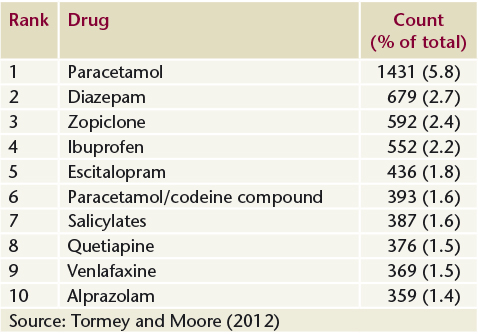Lynn, Ena
(2012)
Poisoning and clinical toxicology: a template for Ireland.
Drugnet Ireland,
Issue 43, Autumn 2012,
p. 19.
A recently published article reviewed poisons information and clinical toxicology in Ireland.1 There are two centres in Ireland from which information on poisons is accessible 24 hours a day: the Poisons Information Centre of Ireland in Dublin, and the Regional Medicines and Poisons Information Service in Belfast. These centres are supported by a consultant toxicologist advisory service.
The Poisons Information Centre of Ireland (01 8092566) offers a telephone information service for healthcare professionals on a 24/7, 365-days-a-year basis. Enquires are answered by poisons information officers between 8.00am and 10.00pm; calls outside of these hours are automatically diverted to the UK National Poisons Information Service at no extra charge.
The public poisons information service (01 8092166), also based in the Poisons Information Centre of Ireland, is for the general public, in particular parents and carers of young children. This service is available between 8.00am and 10.00pm daily. Outside of these hours the general public should contact their general practitioner or a hospital emergency department.
Toxbase, an online clinical toxicology database in the UK, has been available to Irish health professionals since 2001. Since then it has become the main source of information on poisons, with usage increasing annually. It is available to health professionals in emergency department and intensive care units; 99% of queries come from emergency departments. Toxbase is not available to laboratory staff.
The information most commonly accessed on Toxbase by health professionals in Ireland relates to paracetamol, diazepam, analgesics and psychoactive compounds (Table 1).

The authors state that data from the National Drug-Related Deaths Index (NDRDI) is the most accurate available information on toxicological deaths in Ireland.2 They suggest a more detailed review of the ‘Other prescription medication’ involved in poisoning deaths as recorded by the NDRDI in order to identify factors to prevent fatal overdoses from these medications in the future.
In conclusion, the authors recommend the following:
· provision by the HSE of a web-based, open-access Toxbase or equivalent as a public service;
· co-location of poisons information and laboratory clinical toxicology;
· establishment of a national clinical toxicology institute for Ireland;
· a list of accredited medical advisors in clinical toxicology available for consultation in Ireland;
· multidisciplinary case conferences in complex toxicology scenarios for coronial cases;
· development of a template of standard scenarios on common findings in biochemical toxicology for coronial cases;
· establishment of a national clinical toxicology referral out-patient service in Dublin; and
· tracking changing patterns in the use of drugs of abuse in Ireland – clinically, biochemically and through access to treatment.
1. Tormey WP and Moore T (2012) Poisonings and clinical toxicology: a template for Ireland.
Irish Journal of Medical Science, Online First. 22 May 2012.
www.drugsandalcohol.ie/175982. Health Research Board (2011)
Drug-related deaths and deaths among drug users in Ireland: 2009 figures from the National Drug-Related Deaths Index. Available at
https://www.drugsandalcohol.ie/16365/